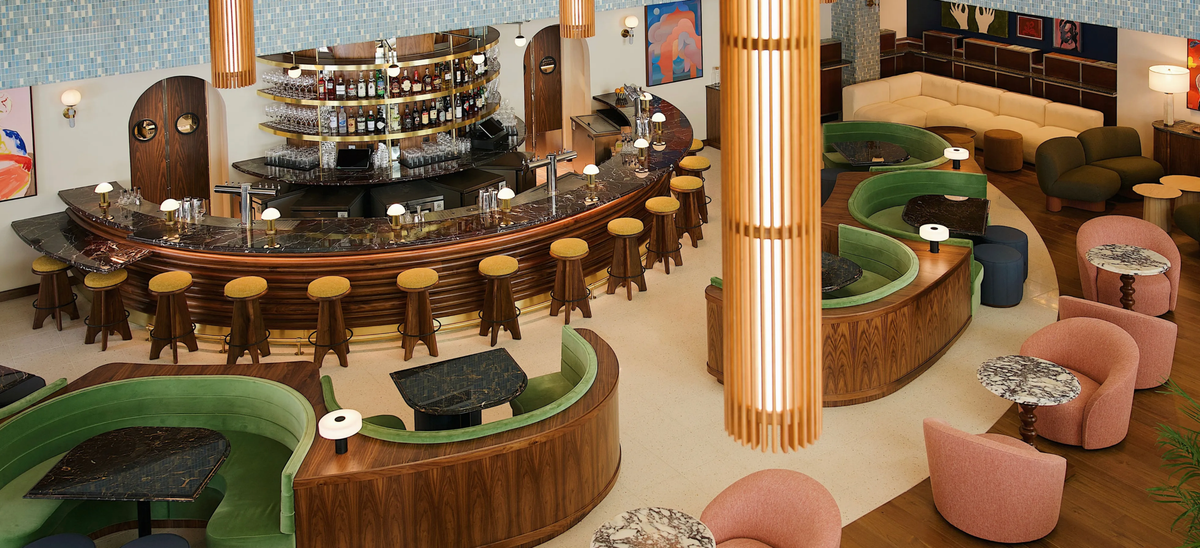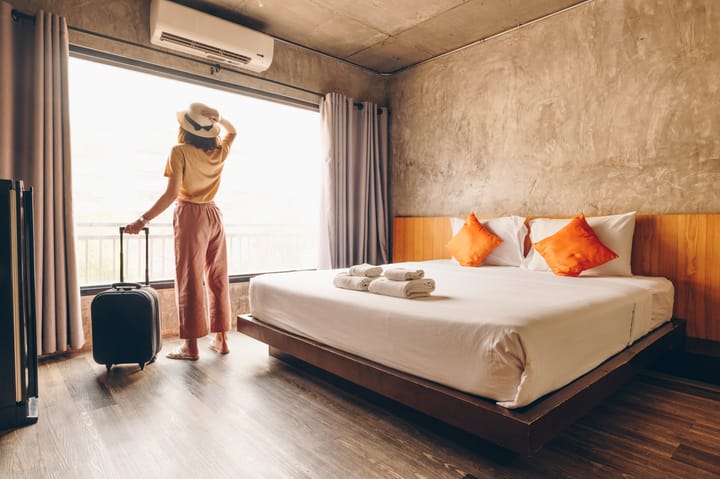🥐 Carb appeal
Plus: A reminder to invest in your junior staff ASAP

Globetrotting for carbs is officially a thing and it’s serving up sweet new opportunities. In this issue, we’re digging into how patisseries the world over are tapping into bakery tourism. (Croissant crawls? Yes, please!) 🥐
We’re also unpacking what investors should really look for in operating agreements and how innovative structures are redefining the balance between oversight and operational success.
And since peak season is prime time not just for guests but for cyberthreats, we’ve got expert tips to keep your systems secure. From pastries to policies to protection, we’ve got your back. Let’s roll!

Carb appeal. Younger generations are swapping binge drinking for early morning pastry runs in a new trend known as bakery tourism. Mouth-watering itineraries crafted from viral videos document Paris croissant crawls, East London bakery tours, bucket-list eateries in Seoul and more. Can your hotel hop on board?
On the safe side. Summer’s in full swing and so are cyberthreats to hotels, with attackers eyeing the busy season as prime time. The silver lining? Teams with the right security support are staying steps ahead and keeping the chaos where it belongs (poolside, not online).
Unflagged and unbothered. This candid chat with CEO Lindsey Ueberroth dives into how a bold family move transformed Preferred Hotels into a global indie powerhouse. From de-flagging trends to loyalty perks, she shares real talk and smart strategies for anyone shaping the future of hospitality.
Skip the middlemen. Why let third parties steal the spotlight (and your profits)? Learn how to take back control with these five key strategies to help you compete and win the direct booking game.
Radio silence could be a good thing. Running lean doesn’t have to mean running ragged. Put down the walkie-talkies and sticky notes and tune in to this LinkedIn Live, which explores how hotels can work smarter (not harder) with automation through tech that’s simple, efficient and team-friendly. Peak season just got a little less chaotic.

‘We're giving independent hotels a technological superpower’
Journey is redefining hospitality loyalty—not with points or perks, but through deeply personal guest experiences. Founded by former Red Ventures executive John Sutton, the new “hospitality experience platform” helps independent hotels deliver tailored, human-centered stays at scale using smart data and seamless system integration.
Rooted in design, storytelling and entrepreneurial passion, Journey reimagines how travelers connect with the places—and people—they encounter. Sutton spoke with Mint Pillow just prior to Journey’s July 9 launch, highlighting how the platform creates meaningful connections regardless of guest status or spend.
—Jennifer Glatt
What inspired the creation of Journey, and how is it different from other hotel loyalty programs?
Journey was born from my personal frustration with existing loyalty programs. After spending over a decade developing customer data platforms, I realized travelers want more than just points. We're not just creating another rewards program; we're reimagining what loyalty truly means. Traditional programs have become transactional; we want to help independent hotels compete with large corporate brands by providing technology that personalizes the guest experience. Unlike traditional programs that simply offer points, we're focused on creating deep connections. Our goal is to make travelers feel truly valued, not just give them a free bottle of water at check-in.
How does Journey's technology help independent hotels improve their guest experience?
We're giving independent hotels a technological superpower. Most small hotels can't compete with big corporate brands' data capabilities, so we've built a platform that levels the playing field. Our hospitality experience platform uses AI to help hotels understand guest preferences deeply. Imagine a system that can anticipate a guest's needs before they even arrive—that's what we're creating.
How are you solving travelers' frustrations with existing loyalty programs?
I am a frequent traveler who felt increasingly disappointed with traditional programs. Points get devalued, experiences become generic. We're flipping that model. Our goal is to make every traveler feel genuinely special. We want to learn about your preferences, understand your travel style and create experiences that feel personally crafted just for you. Journey addresses major frustration points. First, we eliminate the uncertainty of "upon availability" for upgrades and early check-ins. Second, we've created a points system that's more flexible—users can spend pending points for on-stay purchases. We're also the first platform combining independent hotels and short-term rentals, giving travelers a more comprehensive discovery experience.
What's the biggest technological innovation in Journey's approach?
Our AI-powered platform is designed to be a true travel companion. We're not just collecting data; we're creating an intelligent system that learns and adapts. By understanding your preferences—the videos you engage with, the properties you favorite, the experiences you enjoy—we can create a more personalized travel experience.
What's the long-term vision for the platform?
We want to democratize exceptional travel experiences. With over 1,400 properties already in our alliance—and that number is growing daily—we're building a network that empowers independent hotels to compete with large corporate brands. Our long-term vision is to become the premier platform for independent hotels and rentals, providing technology that levels the playing field with large corporate brands. The ultimate goal is to transform loyalty from a transactional reward program into a meaningful connection that makes every traveler feel truly understood and valued.
This Q&A has been edited for brevity. Read the full interview here.


Take all my money
What was once a 1960s-era First Federal Savings and Loan Association building has been cleverly reborn as Savannah's Municipal Grand, a luxury boutique hotel that feels like stepping into a sumptuous Southern living room. It’s a blueprint for reclaiming historic spaces with playful, purpose‑driven design, blending heritage architecture with warm, contemporary style.
Why it matters: You’ll find plenty of inspiration in how the Municipal Grand turns design into a storytelling tool. The curved bar at the heart of the lobby isn’t just a statement piece—it creates a magnetic gathering spot that blurs the line between hotel and neighborhood hangout. Rather than erase the building’s past, the team honored its quirks—like the vintage blue tile, terrazzo floors and granite walls—while layering in modern touches that feel intentional, not trendy. The 44 bespoke guest rooms carry that same thoughtful vibe, with custom woodwork, patterned tile and balconies that invite guests to linger. (Garden & Gun)

I’ll take ‘hybrid leases’ for $500, Alex
Any idea what an inverted management agreement is? How about a manchise agreement? Understanding the nuances of operating agreements is crucial in a market that’s anything but predictable. The rise of hybrid models—blending elements of leases and management contracts—provides opportunities to balance control with performance.
Why it matters: Tailoring agreements to specific objectives, whether maximizing cash flow or preparing for an exit, can significantly impact long-term success. As the industry moves towards more flexible and creative partnerships, staying informed ensures that owners can make strategic decisions that align with their goals. Ultimately, selecting the right operating agreement is not just about structure; it's about setting the foundation for sustained growth and profitability. (Hospitality Investor)

Design sets the stage, experience steals the show
As with any real estate transaction, “location location location” will only take you so far. Modern hotel design, beyond aesthetics and sustainability, takes the lead from there, and independent hotels should blaze the trail in designing with heart, soul and intention. Savinien Caracostea, co-founder and creative director of META Foundation—an organization that addresses environmental, social and cultural challenges through a comprehensive approach to hospitality and technology—says designing hotels today is not about trends or materials, but about meaning.
"How can we re-enchant the spaces that we create to help us reconnect...and connect us to things that should easily be able to compete with a virtual experience?" —Savinien Caracostea, co-founder and creative director of META Foundation
Why it matters: For indie hotel owners, this is a reminder (and a bit of a rally cry) that stellar design goes way beyond Instagrammable lobbies. "Architecture is the hardware. Hospitality is the software," Caracostea asserts. The difference between space and experience is that buildings set the stage, but what guests remember is how it feels, how it flows and how they’re treated within it. (Hotel Spaces)

Motivation that matters
Want your younger employees to be motivated, happy and interested in sticking around? Aligning incentives with real work functions and tangible benefits can motivate your millennial and Gen Z employees.
Why it matters: It’s all about giving your staff real incentives, clear career paths and a culture that makes them want to show up every day. Happy employees mean fewer turnover headaches and more consistent, quality care for guests. This panel recap from June’s 2025 HSMAI Commercial Strategy Conference offers compelling insight into younger employees’ mindsets. Bottom line: investing in your junior talent today pays off with loyal staff and a hotel that shines from the inside out. (CoStar)
Thanks for reading today's edition! You can reach the newsletter team at newsletter@mintpillow.co. We enjoy hearing from you.
Interested in advertising? Email us at newslettersales@mvfglobal.com
Mint Pillow is curated and written by Jennifer Glatt and edited by Lesley McKenzie.




